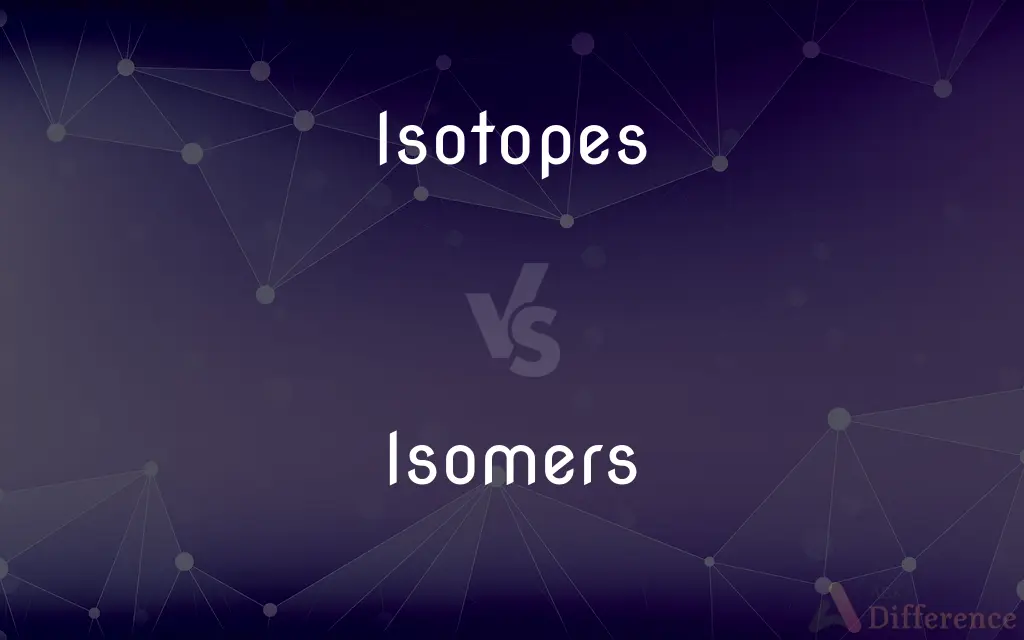Isotopes vs. Isomers — What's the Difference?
By Fiza Rafique & Maham Liaqat — Published on May 29, 2024
Isotopes are variations of elements with the same number of protons but different numbers of neutrons, affecting mass. Isomers have identical molecular formulas but differ in atom arrangements or bonds, influencing structure and properties.

Difference Between Isotopes and Isomers
Table of Contents
ADVERTISEMENT
Key Differences
Isotopes are variants of the same chemical element, differing in neutron count, which alters their atomic mass but not their chemical behavior. For instance, Carbon-12 and Carbon-14 are isotopes of carbon, sharing chemical properties but differing in mass.
Isomers, however, share the same molecular formula but have distinct arrangements of atoms or types of bonding, leading to different physical and chemical properties. For example, butane and isobutane are isomers with different structures and boiling points.
The concept of isotopes is crucial in fields like nuclear physics and radiometric dating, as the differing mass due to neutrons affects stability and radioactive decay. Isomers, on the other hand, are significant in chemistry and biology, where the arrangement of atoms impacts molecular function, as seen in the sweetness difference between glucose and fructose, despite having the same formula.
Isotopes do not influence the basic chemical reactions of an element, as electron arrangements, governed by the number of protons, remain unchanged. Isomers can exhibit vastly different chemical behaviors due to their structural variations, affecting how they interact with other molecules.
In terms of applications, isotopes are used in medical imaging and treatment, such as radioactive iodine in thyroid cancer therapy. Isomers have diverse applications depending on their properties, like the use of different vitamin D isomers in supplements for varying bioavailability.
ADVERTISEMENT
Identification of isotopes involves measuring atomic mass, often using mass spectrometry, while distinguishing isomers requires analyzing molecular structure, achieved through techniques like nuclear magnetic resonance (NMR) spectroscopy.
Comparison Chart
Definition
Variants of elements with different neutrons
Compounds with same formula, different arrangement
Chemical Behavior
Similar
Can be vastly different
Physical Properties
Mass varies
Structural properties like boiling points vary
Examples
Carbon-12 and Carbon-14
Butane and isobutane
Significance
Important in nuclear physics, radiometric dating
Crucial in organic chemistry, biology
Compare with Definitions
Isotopes
Share chemical properties.
All isotopes of oxygen react similarly with hydrogen to form water.
Isomers
Compounds with identical molecular formulas but different structures.
Ethanol and dimethyl ether are isomers used in different applications.
Isotopes
Vary in stability.
Carbon-12 is stable, while Carbon-14 undergoes radioactive decay.
Isomers
Structural isomers have different connectivity.
Pentane and isopentane differ in the arrangement of their carbon atoms.
Isotopes
Used in medical diagnostics.
Technetium-99m is an isotope used in nuclear medicine imaging.
Isomers
Geometric isomers have different spatial orientations.
Cis-trans isomers of 2-butene exhibit different physical properties.
Isotopes
Variants of an element with differing neutron counts.
Hydrogen has three isotopes: protium, deuterium, and tritium.
Isomers
Influence on properties.
The boiling point of isobutane is lower than that of butane due to structural differences.
Isotopes
Identified by atomic mass.
Uranium-235 and Uranium-238 are isotopes used in nuclear reactors and weapons.
Isomers
Optical isomers are mirror images.
D- and L-glucose are optical isomers with different biological roles.
Isotopes
One of two or more atoms having the same atomic number but different mass numbers.
Isomers
(Chemistry) Any of two or more substances that have the same molecular formula but differ in the way their atoms are connected to each other, in the spatial orientation of their atoms, or, in the case of large molecules such as DNA, in their molecular topology.
Isotopes
Plural of isotope
Isomers
(Physics) Any of two or more nuclei with the same mass number and atomic number that have different radioactive properties and can exist in any of several energy states for a measurable period of time.
Isomers
Plural of isomer
Common Curiosities
Why are isomers important in biology?
Isomers can have vastly different biological activities, affecting how drugs, vitamins, and other compounds function in biological systems.
Can isotopes of the same element have different chemical properties?
Generally, isotopes have identical chemical properties because they have the same electron configuration.
What defines an isotope?
An isotope is defined by its number of neutrons, differing among atoms of the same element.
What role do isotopes play in medical imaging?
Radioactive isotopes are used in medical imaging to diagnose and monitor various diseases.
Can isomers be separated easily?
Some isomers can be separated based on their physical properties, while others require more complex methods.
Do isotopes occur naturally?
Yes, isotopes of elements occur naturally, with varying abundances.
What is an example of an isomer used in everyday life?
Aspartame and neotame, sweeteners with the same formula but different structures, are examples of isomers.
Can the difference in isotopes be seen with the naked eye?
No, isotopes cannot be distinguished visually; they require specialized instruments for identification.
Are all isotopes radioactive?
No, only some isotopes are radioactive; others are stable.
Why do isomers have different boiling points?
The differences in molecular structure among isomers can lead to variations in physical properties like boiling points.
How do isomers differ from each other?
Isomers differ in the arrangement or connectivity of atoms within the molecule.
What is a structural isomer?
Structural isomers are compounds with the same molecular formula but different arrangements of atoms.
Are isotopes used in any industries outside of medicine?
Yes, isotopes are used in industries such as nuclear energy, environmental tracking, and scientific research.
How are isomers relevant to pharmaceuticals?
Isomers can have different therapeutic effects or toxicities, making their distinction crucial in drug development and safety.
How do isotopes affect atomic mass?
The presence of different numbers of neutrons in isotopes leads to variations in atomic mass.
Share Your Discovery

Previous Comparison
Kitten Food vs. Cat Food
Next Comparison
Chai vs. Dirty ChaiAuthor Spotlight
Written by
Fiza RafiqueFiza Rafique is a skilled content writer at AskDifference.com, where she meticulously refines and enhances written pieces. Drawing from her vast editorial expertise, Fiza ensures clarity, accuracy, and precision in every article. Passionate about language, she continually seeks to elevate the quality of content for readers worldwide.
Co-written by
Maham Liaqat












































